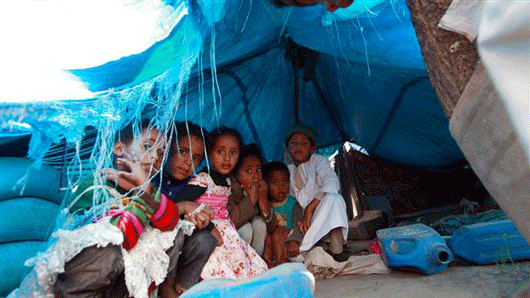
Local Editor
The United Nations humanitarian coordinator says that although famine has so far been averted in Yemen, the situation remains dire.
Speaking to Reuters after a tour of the Yemeni port city of Hodeidah, Under-Secretary General for Humanitarian Affairs and Emergency Relief, Stephen O’Brien further warned that the country’s medical system was on the verge of collapse.
"We have managed to avert what otherwise might have descended into the technical description of famine, but it is very [very] tight indeed," said O’Brien after touring a local hospital in Hodeidah and witnessing "terrifying" images of severely malnourished children.
"We have 7 million people in very very severe and acute malnutrition, I met babies in the pediatric and in the feeding wards of the hospital it was absolutely terrifying so thin, so malnourished. It was absolutely appalling to see," he said.
"That’s why we need to get not only food but medical items in, because the other thing that is almost obliterated is the health service," said O’Brien.
Even before the war, Yemen was one of the poorest countries in the Arab world, relying overwhelmingly on imports to satisfy the country’s food, fuel and medical needs.
Yemen imports more than 90 percent of its food, including most of its wheat and all its rice. Some 21 million of Yemen’s 28 million people need some form of humanitarian aid and more than half the population suffers from malnutrition.
Since March of last year, food shipments into the country are facing stringent checks and delays due to a virtual blockade by the Saudi-led coalition that has backed the regime of Abd Rabbu Mansour Hadi during an 18-month war.
O’Brien called on all parties to lift unnecessary restrictions and obstacles to the movement of desperately needed food and aid to those most in need across the country.
"We need greater facilitation by the authorities at every level, whether it’s here in Sana’a or in Hodeidah or elsewhere in Yemen. The authorities, whoever they are, need to able to give us great and quick facilitation, not put administrative burdens in our way, not to distrust us," said O’Brien.
He said the latest UN verification and inspection mechanism ensured that there can be "complete confidence" that ships bringing in vital supplies into the country could be trusted.
He further blamed delays at the ports on war-damaged port infrastructure, including smashed and inoperative cranes that limit the capacity to unload ships loaded with food and fuel.
O’Brien further cautioned that funding shortages will only exacerbate an already difficult situation. He said current funding from international donors remains at 46 percent.
Saudi Arabia began its deadly campaign against Yemen in late March 2015. The strikes were meant to undermine the Houthi Ansarullah movement and restore power to fugitive former president Abd Rabbu Mansour Hadi.
About 10,000 people have been killed and over 16,000 injured since Riyadh launched the airstrikes. The Saudi aggression has also taken a heavy toll on Yemen’s facilities and infrastructure.
Source: News Agencies, Edited by Website Team